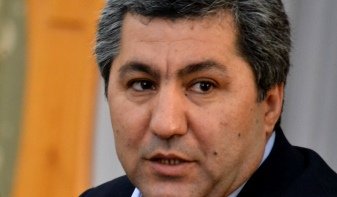
Tajikistan Bans Leading Opposition Party
Publication: Eurasia Daily Monitor Volume: 12 Issue: 163
By:

Following years of pressure, the government of Tajikistan has finally banned the Islamic Renaissance Party (IRPT), the region’s only faith-based party. In an August 28 statement, the Ministry of Justice declared that the “Islamic Renaissance Party of Tajikistan is no longer a republican party” (Khovar, August 28). Given that the IRPT has closed offices in 58 districts in recent weeks, the ministry argued, it no longer represents the people. According to the statement, the IRPT is violating Article 3 of the “Law on Political Parties,” which states that parties need to have operations in “most regions, cities and districts” of the country (ICNL, November 13, 1998). The regime gave the IRPT ten days to completely shut down its operations.
The move is the culmination of years of governmental restrictions on the party’s operations. Founded during the last years of the Soviet Union, the Islamic Renaissance Party fought on the side of the opposition during newly independent Tajikistan’s civil war in the early 1990s. In the 1997 peace deal that ended the conflict, the opposition received 30 percent of government posts. But since then, the regime of President Emomali Rahmon has marginalized, removed, imprisoned and killed almost all of its former opponents. In the March 2015 elections, the party lost its two seats in the Tajikistani parliament after failing to clear the five percent threshold needed to win parliamentary seats (see EDM, March 24).
Lacking a voice in the parliament, the opposition party has come under increased pressure. The IRPT’s leader since the death of founder Said Abdullah Nuri in 2007, Muhiddin Kabiri, has been in self-imposed exile since before the election. On June 16, the state-controlled newspaper Jumhiriyat accused Kabiri of illegally buying property in 1999 (Jumhiriyat, June 16). Kabiri fears he will fall victim to the same fate as others who have fallen afoul of the regime. In 2013, similar charges were leveled against former industry minister Zaid Saidov. After attempting to set up a political party, Saidov was arrested and jailed for 26 years (Asia Plus, July 9).
With Kabiri in exile, the party seems to have imploded. In June, IRPT deputies started resigning and closing their offices across the country (YouTube, June 23). Deputies cited the party’s poor performance in the elections and a series of scandals involving members for their move. Some of the deputies vowed to join the ruling People’s Democratic Party. More closures have followed: On August 14, city authorities closed the party’s publishing house, Muattar, for violating sanitary and medical regulations (Asia Plus, August 14). Two weeks later, the Prosecutor General ordered that the IRPT’s central office be closed due to an “unresolved dispute about the legality of the building’s acquisition” (Radio Ozodi, August 25).
As well as shutting down party offices, the regime has orchestrated a campaign to discredit the party. Before the elections, this focused on allegations of sexual impropriety amongst the party’s leadership (Ozodagon, February 22). Officials have also tried to link IRPT members to terrorism and violence in the Middle East. On the eve of the March 2015 elections, state-sanctioned imams warned worshippers not to vote for the IRPT. “Is it not this party that divided people? Is it not this party that brought you to Afghanistan [as refugees during the country’s civil war], bringing hunger, poverty and humiliation?” the sermon reportedly read (Radio Ozodi, March 27). This came amidst the publication in state-controlled news outlets of dozens of articles linking the Islamic Renaissance Party to violence.
The authorities have also made numerous attempts to connect the party to the Islamic State. Officials have claimed that many of the estimated 500 Tajikistani citizens fighting in Syria and Iraq have links to the IRPT (Jumhuriyat, March 17; Jumhuriyat, August 18). After a black Islamic State flag was unveiled in Nurek (Khatlon province, west-central Tajikistan) in late August, the security services arrested over twenty people. An undisclosed number of them, the authorities claim, are IRPT members. A spokesman for the Ministry of Interior accused the party of being “directly engaged in the propaganda of IS’s [Islamic State’s] extremist ideas” (The News, August 30).
The banning of the IRPT constitutes a milestone in the consolidation of President Rahmon’s power. Whereas the legal existence of a domestic Islamic party proved useful in Tajikistan’s relations with the Organization of the Islamic Conference as well as Muslim-majority countries like Saudi Arabia and Iran, the regime now clearly feels secure enough to relegate the party to the past.




